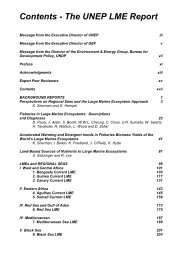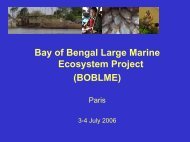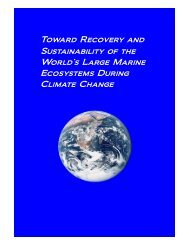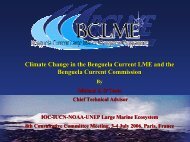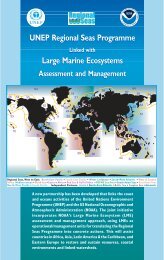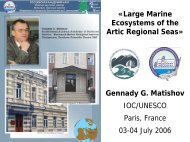Sustaining the World's Large Marine Ecosystems
Sustaining the World's Large Marine Ecosystems
Sustaining the World's Large Marine Ecosystems
You also want an ePaper? Increase the reach of your titles
YUMPU automatically turns print PDFs into web optimized ePapers that Google loves.
The development of <strong>the</strong> BCLME project proposal known as <strong>the</strong> Project<br />
Development Facility (PDF) phase was a long and complicated process taking<br />
over two years to complete, but it was viewed as essential in laying down <strong>the</strong><br />
groundwork and structures for <strong>the</strong> very successful implementation phase. It was<br />
carried out in 1997-2000 and consisted of <strong>the</strong> following milestones:<br />
a) Syn<strong>the</strong>sis and assessment of information on <strong>the</strong> BCLME<br />
This important part of <strong>the</strong> process was <strong>the</strong> ga<strong>the</strong>ring of data to syn<strong>the</strong>size and<br />
assess <strong>the</strong> existing information which was <strong>the</strong>n compiled into a suite of six<br />
comprehensive reports on fisheries, oceanography and environmental variability,<br />
marine diamond mining, <strong>the</strong> coastal zone, offshore oil and gas and socioeconomics.<br />
These reports that identified key issues, threats and gaps in<br />
knowledge, were reviewed by experts and submitted as supporting appendices<br />
with <strong>the</strong> PDF proposal to <strong>the</strong> GEF.<br />
b) First Stakeholder Workshop – Broad Consultations<br />
The first stakeholder workshop was held in Cape Town in July 1998. It brought<br />
toge<strong>the</strong>r <strong>the</strong> key players and stakeholders from <strong>the</strong> region as well as<br />
representatives from outside international agencies. This workshop was an<br />
important milestone in building trust, co-operation and consensus on forging a<br />
way ahead for <strong>the</strong> development of a co-ordinated integrated approach to BCLME<br />
management. The use of a professional moderator ensured broad involvement<br />
and a bottom up approach with regional scientists and managers driving <strong>the</strong><br />
agenda.<br />
The workshop defined <strong>the</strong> broad issues and agreed on a work plan that outlined<br />
responsibilities and a timetable to achieve <strong>the</strong> necessary actions. It also<br />
established formal mechanisms for communication and consultation between key<br />
stakeholders. There was broad stakeholder participation including from all <strong>the</strong><br />
government ministries and relevant agencies, <strong>the</strong> three countries, and from <strong>the</strong><br />
commercial and artisanal fisheries sectors, mining, oil and gas, port authorities,<br />
tourism sectors, various NGOs and some donor agencies.<br />
c) Second Stakeholder Workshop – Transboundary Diagnostic Analysis<br />
(TDA)<br />
The second regional workshop, smaller and more focused, was tasked with<br />
developing a Transboundary Diagnostic Analysis (TDA) for <strong>the</strong> BCLME. It was<br />
held in Okahandja, Namibia in April 1999 and was attended by key government<br />
ministries from <strong>the</strong> region as well as by representatives of <strong>the</strong> private sector,<br />
NGOs, donors and GEF consultants. The main objective of <strong>the</strong> workshop was to<br />
define and agree on <strong>the</strong> major elements of <strong>the</strong> TDA, achieve consensus on a<br />
framework for <strong>the</strong> Strategic Action Plan (SAP), and ensure ownership of <strong>the</strong><br />
process and outputs by <strong>the</strong> stakeholders.<br />
53



